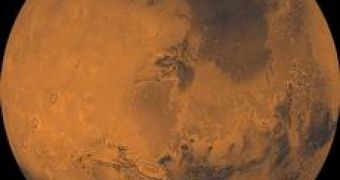The current mean temperature on the equator of Mars is a blustery -69 degrees Fahrenheit. Scientists have long thought that the Red Planet was once temperate enough for water to have existed on the surface and perhaps for life to have evolved there. But a new study by MIT and Caltech scientists gives this idea the cold shoulder.
In the July 22 issue of the journal Science, MIT Assistant Professor Benjamin Weiss and California Institute of Technology graduate student David Shuster report that their studies of martian meteorites demonstrate that at least several rocks originally located near the surface of Mars have been freezing cold for 4 billion years.
Their work is a novel approach to extracting information on the past climate of Mars through the study of martian meteorites.
In fact, the evidence suggests that during the last 4 billion years, Mars has never been sufficiently warm for liquid water to have flowed on the surface for extended periods of time. Mars therefore has probably never had an environment hospitable to the evolution of life--unless life got started during the first half-billion years of its existence, when the planet was probably warmer.
The work involves two of the seven known "nakhlite" meteorites (named after El Nakhla, Egypt, where the first such meteorite was discovered), and the celebrated ALH84001 meteorite that some scientists believe shows evidence of microbial activity on Mars. Using geochemical techniques, Shuster and Weiss reconstructed a "thermal history" for each of the meteorites to estimate the maximum long-term average temperatures to which they were subjected.
"We looked at meteorites in two ways," said Weiss, of MIT's Department of Earth, Atmospheric and Planetary Sciences. "First, we evaluated what the meteorites could have experienced during ejection from Mars, 11-to-15 million years ago, in order to set an upper limit on the temperatures in a worst-case scenario for shock heating."
They concluded that ALH84001 could never have been heated to a temperature higher than 650 degrees Fahrenheit for even a brief period of time during the last 15 million years. The nakhlites, which show very little evidence of shock damage, were unlikely to have been above the boiling point of water during ejection 11 million years ago.
On a positive note for astrobiology, however, Weiss says the new study does nothing to disprove the theory of "panspermia," which holds that life can jump from one planet to another by meteorites. While at Caltech as a graduate student several years ago, Weiss and his supervising professor, Joseph Kirschvink, showed that microbes could indeed have traveled from Mars to Earth in the hairline fractures of ALH84001 without being destroyed by heat. In particular, the fact that the nakhlites have never been heated above about 200 degrees Fahrenheit means that they were not heat-sterilized during ejection from Mars and transfer to Earth.
If you want to read the whole article, please visit http://web.mit.edu/newsoffice/2005/mars.html

 14 DAY TRIAL //
14 DAY TRIAL //